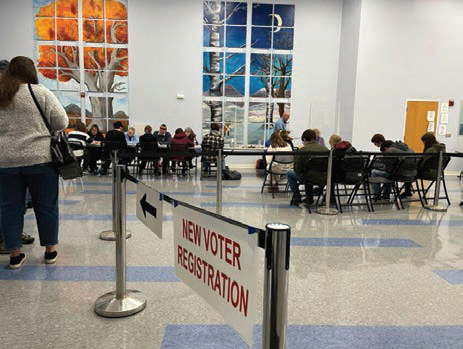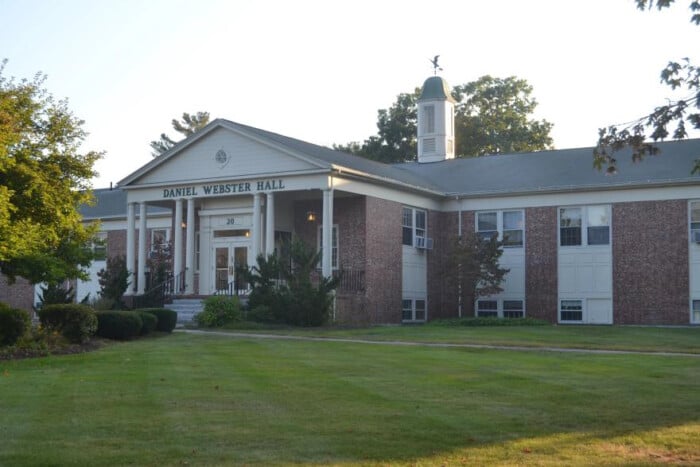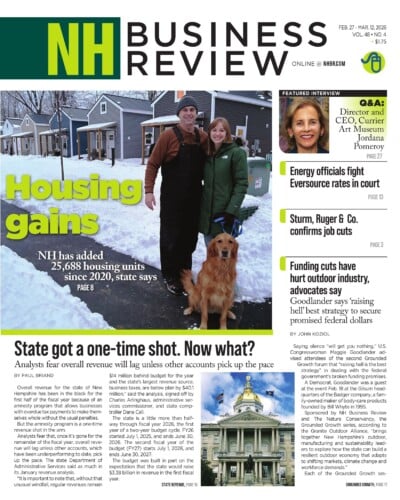Young Granite Staters are finding it difficult to cross what’s being called a “Bridge to Happiness.”
A new survey from Stay Work Play NH, an organization devoted to the interests of younger men and women in New Hampshire, shows that adults aged 26 to 35 aren’t very optimistic when it comes to the life altering events of buying a home, starting a family and advancing their careers here.
Younger Granite Staters, those 18 to 25 who haven’t approached the bridge, have a better sense of optimism about living in New Hampshire, according to the survey data. And those that have successfully crossed the bridge also have a high level of satisfaction about being here.

Corinne Benfield is the executive director of Stay Work Play NH.
It’s that 26 to 35 group that is starting to navigate that bridge, uncertain about whether they can stay in New Hampshire or make a go of it elsewhere.
“These are folks that are living in New Hampshire, and they’re participating in New Hampshire’s economy, so we haven’t lost them yet. But I think what this data shows us is that they’re the most at-risk cohort,” said Corinne Benfield, executive director of Stay Work Play NH.
The organization coined the phrase “Bridge to Happiness” to describe when people are trying to buy homes, start families and advance in their careers.
Benfield notes the pathway to crossing the bridge here has gotten harder as housing, childcare and career growth weigh heavily on their minds. To get this important demographic to stay, according to Benfield, policy makers and businesses have to lower barriers that impede housing, having children, and advancing careers.
Stay Work Play NH presented its findings -—its third such Quality of Life Index — to about 100 people Nov. 6 at St. Anselm College’s New Hampshire Institute of Politics. The survey was done by the college’s survey center and presented in collaboration with the college’s Office of Partnerships and its Initiative for Housing Policy and Practice.
Listed among the key findings are these:
- The state’s core strengths — safety, the tax environment, and access to nature/outdoor recreation — remain top reasons young people choose New Hampshire;
- The pressure points of housing affordability, childcare access, mental health care, public transportation and perceptions of career opportunity are intensifying;
- There’s a big swing regionally on quality-of-life issues — better in the southern area of the state, particularly around the Seacoast, worse in the North Country;
- There are fewer promoters of the state, fewer young people who vocally advocate for life in the Granite State. There’s a growing sense of “meh, it’s fine;”
- Social life is an important community connection that’s lacking for young people;
- Despite all the challenges, the number of respondents who say they intend to remain in New Hampshire has increased since 2023.
Stay Work Play NH advocates for the 20-to-40-year-olds in the state. The survey included 18- and 19-year-olds to also capture the mood of college age students, according to Benfield.
A couple of results surprised her, compared to previous surveys. One was the dim view of jobs and careers here in New Hampshire. The other — when asked to describe their ideal neighborhood — was a majority desire to live in rural New Hampshire.
“When we asked folks about their perception of the quality of jobs and careers in New Hampshire, 50% of respondents said that New Hampshire is worse for quality of jobs and career quality, which I think is a really major signal for us,” Benfield said.
The survey results tell Benfield that more young people while living in the Granite State are working at Massachusetts jobs (either in person or remotely).
“Jobs exist, but the career trajectory that young people are looking for, they’re not really seeing that clear path to advancement,” she said. “They’re also looking at other markets and seeing what they could be earning in, say, Massachusetts, as compared to New Hampshire.”
With the cost of living getting more expensive and the affordability challenges of living in New Hampshire, Benfield is concerned that young people might trade quality of life for higher wages in other states.
This concern, she said, “elevates the need for policy change and progress in housing and child care, and some of the key costs of living drivers in our state.”
WalletHub says New Hampshire ranks fifth in its new report on 2025’s Best & Worst States for Jobs. WalletHub compared the 50 states across 34 key indicators of job-market strength and economic vitality. The data set ranges from employment growth to the median annual income to the average commute time.
According to the report, the Granite State ranked second for job opportunities, 23rd for employment growth, first for unemployment rate, 11th for median annual income (adjusted for cost of living), 18th for average length of the work week in hours, and 21st for job security. WalletHub’s number one spot overall was Massachusetts.
When fashioning the survey questions, particularly about where young people would like to live as their ideal neighborhood, Benfield expected results that showed an urban preference.
“The majority of respondents wanted to live in rural, small-town areas of New Hampshire,” she said.
“What’s striking about that preference is that we can’t rely solely on our economic hubs like Manchester and Nashua and Concord and Portsmouth to solve the housing crisis,” she added, noting that Stay Work Play advocates for housing solutions that include removing zoning barriers and state funding of housing programs.
She described the legislative session in 2025 that produced several pro-housing laws as a “banner year” but notes more can be done both on the regulatory front and on the state funding front.
“We need all different municipalities to build pathways for young people to be a part of their communities, because not only does that create diversity in our housing landscape, but it’s also what the young people want,” she said. “Young people love New Hampshire for those intrinsic, New Hampshire qualities, the rural space that access to outdoors, the clean living, if you will. They don’t want to change the landscape of your rural community. They just want to be a part of it.”
Anecdotally, she’s heard from folks in her network who, after looking for a house they could afford for two years, have relocated to South Carolina, North Carolina and New Mexico.
The demographic stakes are high, when it comes to future generations.
New Hampshire is the second oldest state (by mean age) in the country behind Maine.
Deaths have exceeded births for the past several years. The population growth the state has seen lately isn’t homegrown; it’s come from migration and most of those (some 60%) are the 18- and 40-somethings that StayWorkPlay is actively trying to retain.
“This is a roadmap,” Benfield said of the survey. “If employers offer flexible work and clearer career pathways, if communities add housing options young people can actually afford, and if the state continues to invest in childcare and transit, we can strengthen that Bridge to Happiness — and keep the next generation here.”















